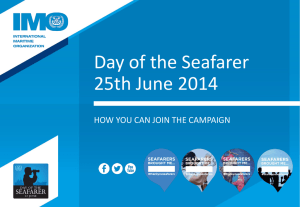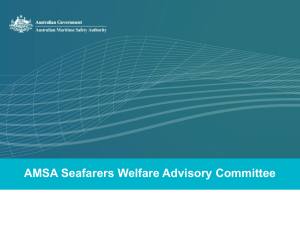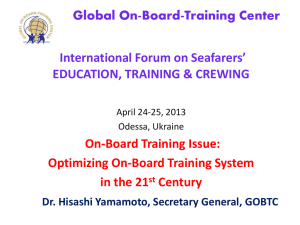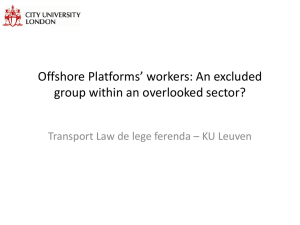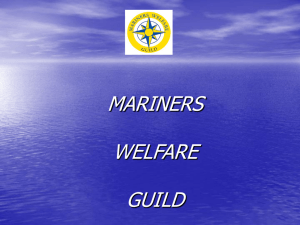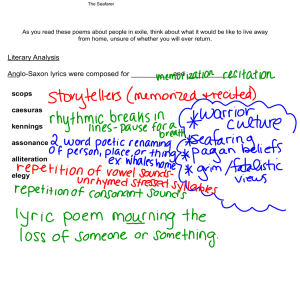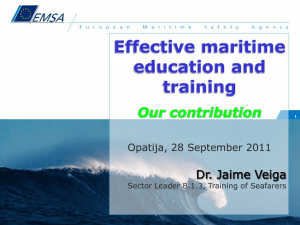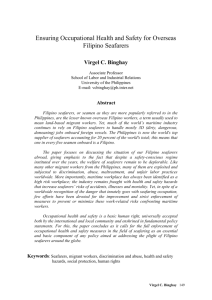Conditions of Employment
advertisement
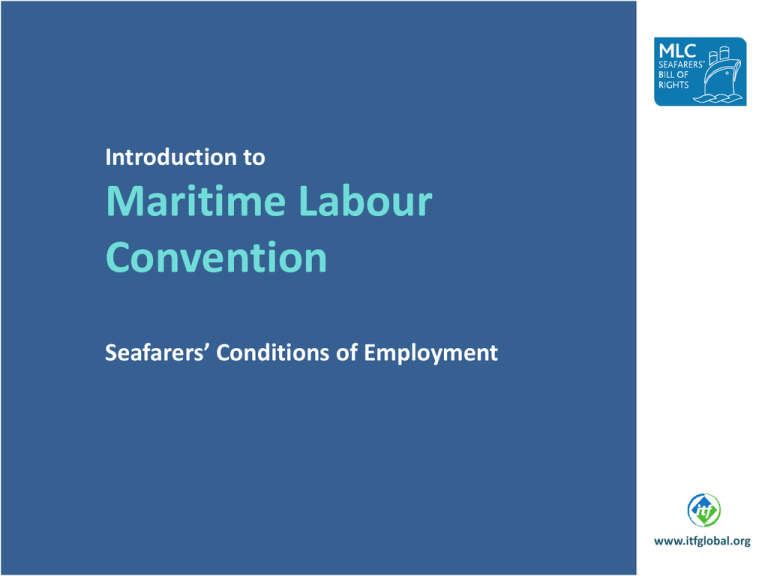
Introduction to Maritime Labour Convention Seafarers’ Conditions of Employment www.itfglobal.org Session Structure Title 1: Minimum requirements for seafarers to work on a ship • Minimum age, medical certificate, training and qualifications and recruitment and placement. Title 2: Conditions of Employment • Seafarers’ employment agreements, wages (overtime and entitlements), hours of work and hours of rest, entitlement to leave, repatriation, seafarer compensation for the ship’s loss or foundering, manning levels and career and skill development and opportunities for seafarers’ employment. CONDITIONS OF EMPLOYMENT www.itfglobal.org Session Structure Title 3: Accommodation, recreational facilities, food and catering • Accommodation and recreational facilities and food and catering. Title 4: Health protection, medical care, welfare and social security protection • Medical care on board ship and ashore, shipowners’ liability, health and safety protection and accident prevention, access to shore-based welfare facilities and social security. CONDITIONS OF EMPLOYMENT www.itfglobal.org Minimum Requirements for Seafarers to Work on a Ship • • • • Minimum age. Medical certificate. Training and qualifications. Recruitment and placement. CONDITIONS OF EMPLOYMENT www.itfglobal.org Seafarers’ Employment Agreement Purpose: To ensure that seafarers have a fair employment agreement. • The terms and conditions for employment of a seafarer shall be set out or referred to in a clear written legally enforceable agreement. • Seafarers’ employment agreements shall be agreed to by the seafarer under conditions which ensure that the seafarer has an opportunity to review and seek advice on the terms and conditions in the agreement and freely accepts them before signing. • Seafarers’ employment agreements shall be understood to incorporate any applicable collective bargaining agreements. CONDITIONS OF EMPLOYMENT www.itfglobal.org What must be in the Employment Agreement? Seafarer’s full name, date of birth/age and place of birth Expiry date Shipowner’s name and address Port of destination - if the contract is for a specific voyage Place where and date when the agreement was signed Health and social security benefits provided by the shipowner Position on board Details of entitlement to repatriation Amount of seafarer’s wages and how they are calculated Reference to the CBA, if applicable Amount of paid annual leave Any other details required by national law Conditions for terminating the contract, including notice period CONDITIONS OF EMPLOYMENT www.itfglobal.org Wages Purpose: To ensure that seafarers are paid for their services. • Seafarers have the right to be paid regularly and in full, at least monthly. • The shipowner must provide the seafarer with a monthly account. • Basic pay or wages means pay for normal hours of work. Basic pay should never be less than the recommended minimum wage. • If seafarers are members of a trade union, their wages will often be negotiated between shipowner and trade union. • The ILO (JMC) sets a recommended minimum wages for Able Seafarers. CONDITIONS OF EMPLOYMENT www.itfglobal.org Overtime • If a seafarer is required to work more than their normal hours of work they should get paid overtime. • Overtime records shall be kept by the Captain and endorsed at least monthly by the seafarer. • If a seafarer has to work on a day that is specified a day of rest or a public holiday either by national laws or the terms of seafarers’ Collective Bargaining Agreement, then the seafarer should be entitled to overtime payment or time off in lieu. CONDITIONS OF EMPLOYMENT www.itfglobal.org Entitlements • Seafarers on the same ship should be paid equal pay for equal work without discrimination. • Seafarers’ employment agreements have to be available on board including rates of pay. • Seafarers’ shall be paid in full for any outstanding remuneration on termination of engagement. • There should be a system in place to penalise owners that don’t pay. • No deductions can be made from seafarers’ pay. • Any charges that are made, shall be fair and reasonable. CONDITIONS OF EMPLOYMENT www.itfglobal.org Hours of Work and Hours of Rest Purpose: To ensure that seafarers have regulated hours of work or hours of rest. • Hours of work and rest are regulated to avoid fatigue and to ensure that the ship is operated safely. • The flag State can decide whether to base the limits on maximum hours of work or minimum hours of rest. Maximum hours of work • Seafarers must not work more than 14 hours in any 24 hour period. • Seafarers must not work more than 72 hours in any seven-day period. CONDITIONS OF EMPLOYMENT www.itfglobal.org Hours of Work and Hours of Rest Minimum hours of rest • Seafarers must have at least 10 hours of rest in any 24 hour period. • Seafarers must have at least 77 hours rest in any seven day period. • The hours of rest can be divided into no more than two periods, one of which must be at least six hours long. • Seafarers cannot work more than 14 hours without taking rest. Normal working hours are based on: • An eight hour day. • One day rest per week. • Rest on public holidays. CONDITIONS OF EMPLOYMENT www.itfglobal.org Entitlement to Leave Purpose: To ensure that seafarers have adequate leave. • Seafarers are entitled to paid annual leave and shore leave. • The entitlement is calculated on the basis of a minimum of 2.5 days for every calendar month of employment. The following should not be counted as annual leave: • Public and customary holidays • Time off for illness, injury or maternity. • Temporary shore leave. • Compensatory leave. CONDITIONS OF EMPLOYMENT www.itfglobal.org Repatriation Purpose: To ensure that seafarers are able to return home. • Seafarers have a right to be repatriated at no cost to themselves. • The maximum period a seafarer can be expected to serve on board before being entitled to repatriation at the shipowner’s expense is 12 months. • Shipowners are not allowed to ask seafarers for a contribution nor can they make a deduction from their wages towards the cost of repatriation unless seafarers have seriously breached the terms of their employment agreement. • If the shipowner fails to pay for seafarers’ repatriation, the flag State must take over this responsibility. CONDITIONS OF EMPLOYMENT www.itfglobal.org www.itfglobal.org Seafarer Compensation for the ship’s loss or foundering Purpose: To ensure that seafarers are compensated when a ship is lost or has foundered. • Seafarers are entitled to adequate compensation in the case of injury, loss or unemployment arising from the ship’s loss or foundering. • In every case of loss or foundering of any ship, the shipowner shall pay to each seafarer on board an indemnity against unemployment. This may be limited to two month’s wages. CONDITIONS OF EMPLOYMENT www.itfglobal.org Manning Levels Purpose: To ensure that seafarers work on board ships with sufficient personnel for the safe, efficient and secure operation of the ship. • Seafarers have the right to work on a safely and securely operated ship. • There must be adequate crew on board (number and qualifications) to ensure the safety and security of the ship and all those on board. • Manning levels must take into account the need to avoid excessive hours of work, ensure sufficient rest, limit fatigue and the nature and conditions of the voyage. • There should be a complaints procedure in place to allow concerns to be raised with the flag State. CONDITIONS OF EMPLOYMENT www.itfglobal.org Career and Skill Development and Opportunities for Seafarers’ Employment Purpose: To promote career and skill development and employment opportunities. • Employment in the maritime sector should be promoted through national policies to encourage career and skill development and greater employment opportunities for seafarers. • The aim of national policies shall be to help seafarers strengthen their competencies, qualifications and employment opportunities. • Clear objectives should be established for the vocational guidance, education and training of seafarers whose duties on board ship primarily relate to the safe operation and navigation of the ship, including ongoing training. CONDITIONS OF EMPLOYMENT www.itfglobal.org Accommodation and Recreational Facilities Purpose: To ensure that seafarers have decent accommodation and recreational facilities on board. • Seafarers are entitled to safe and decent living and recreational facilities on board. • Any requirement relating to the provision of seafarer accommodation and recreational facilities shall apply only to ships constructed on or after the amendment takes effect. • Inspections have to be carried out when a ship is registered, reregistered or when substantial alterations are made to the seafarer accommodation on board. fatigue and the nature and conditions of the voyage. • When setting accommodation and recreational guidelines, attention must be given to design and construction, heating and ventilation, lighting, sleeping rooms, mess rooms, noise and vibration, sanitary facilities, hospital accommodation. CONDITIONS OF EMPLOYMENT www.itfglobal.org Food and Catering Purpose: To ensure that seafarers have access to good quality food and drinking water provided under regulated hygienic conditions. • Food and drinking water served on board must be of appropriate quality, nutritional value, and quantity and takes into account the differing cultural and religious backgrounds. • Seafarers on board a ship shall be provided with food free of charge during the period of engagement. • Seafarers employed as ships’ cooks with responsibility for food preparation must be trained and qualified for their position on board ship. CONDITIONS OF EMPLOYMENT www.itfglobal.org www.itfglobal.org Health Protection, Medical Care, Welfare and Social Scurity Protection • • • • • Medical care on board ship and ashore. Shipowners’ liability. Health and safety protection and accident prevention. Access to shore-based welfare facilities. Social security. CONDITIONS OF EMPLOYMENT www.itfglobal.org Summary Any Questions? CONDITIONS OF EMPLOYMENT www.itfglobal.org
